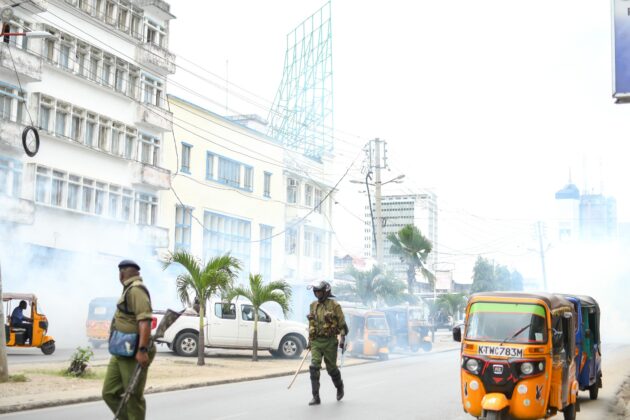
Police, Human Rights Groups Demand Withdrawal of Controversial Demonstration Bill » Capital News
NAIROBI, Kenya Feb 19 – The Assembly and Demonstration Bill 2024 has come under heavy criticism, with police, human rights organizations, civil society groups, and police watchdog bodies calling for its immediate withdrawal.
Critics have branded the bill as retrogressive and unconstitutional, arguing that it infringes on fundamental rights enshrined in the Constitution.
Their concerns were raised as the police proposed amendments to the Public Order Act to regulate noise pollution during protests.
The National Police Service Commission (NPSC) and the National Police Service (NPS) suggested incorporating these changes into the existing law to ensure demonstrations remain peaceful and do not disrupt public order.
The commission’s Director of Legal Affairs, James Nduna, acknowledged that while Kenyans have the right to protest, demonstrations should be conducted in a moderate manner.
“We must have a clear provision on how to regulate noise so that it is controlled – just like in the US, where protests occur with minimal noise,” said Nduna.
He further emphasized that demonstrations should not turn into entertainment events.
“There must be a way of separating noise from protests. We cannot have a situation where people hire a DJ to entertain crowds in the middle of town,” Nduna stated.
NPS Director of Training Wycliffe Opiyo pointed out that the current Public Order Act lacks specific provisions on noise pollution, making it necessary to include regulations addressing this issue.
The debate around the bill intensified as the NPSC, NPS, and the Independent Policing Oversight Authority (IPOA) highlighted that amendments to the Public Order Act are already underway under the supervision of the Attorney General.
They argued that passing a separate bill would result in duplication of laws.
The bill, sponsored by Mbeere North MP Geoffrey Ruku, seeks to provide a legal framework for regulating public assemblies and demonstrations, as outlined in Article 37 of the Constitution.
However, NPSC insists that the existing Public Order Act already offers a sufficient framework for managing protests while maintaining public order.
“The best approach is to amend the Public Order Act to align with international standards rather than creating a separate bill,” Nduna explained.
IPOA Chief Executive Elema Halake strongly opposed the bill, warning that it rolls back fundamental rights, particularly the right to assemble, demonstrate, picket, and petition.
“The bill introduces unnecessary restrictions, including pre-approval requirements by authorities and punitive measures on conveners. These measures unjustifiably limit the exercise of constitutional rights,” Halake stated.
He added that the proposed law grants excessive state control over civic engagement, potentially undermining public participation.
NPS, KNCHR Proposals
Despite their opposition to the bill, NPS has proposed amendments that they believe should be considered if the bill proceeds.
These include reducing the threshold for public gatherings from 100 people (as stated in the bill) to 10 people and introducing a new section to criminalize obstruction during demonstrations and regulate how protests impact traffic flow.
The Kenya National Commission on Human Rights (KNCHR), represented by Commissioner Marion Mutugi, criticized the bill for its biased approach to spontaneous protests.
She pointed out that the bill only protects organized demonstrations while penalizing unplanned or spontaneous protests through the mandatory notification process.
She also questioned Clause 12 (1) of the bill, which severely limits freedom of assembly, and argued that:
“Organizers cannot be held accountable for the actions of every individual in a protest. If rogue individuals cause damage, it is the duty of the police to maintain law and order.”
Additionally, she raised concerns about Clause 7, which requires organizers to assist the police in maintaining peace during protests. She countered that it is the state’s responsibility to ensure public order, not the duty of protest organizers.